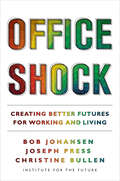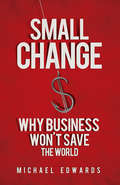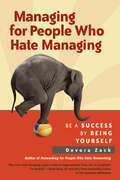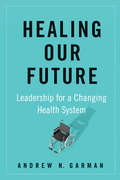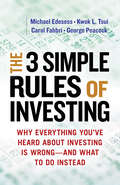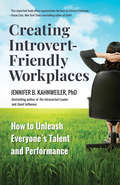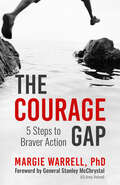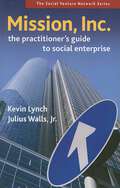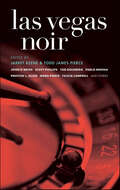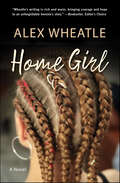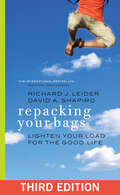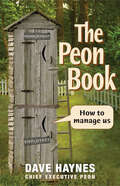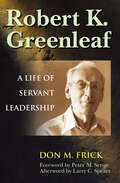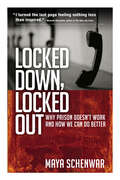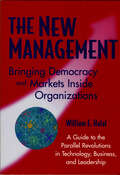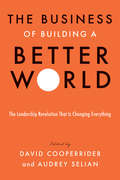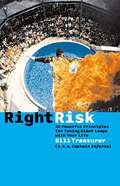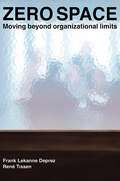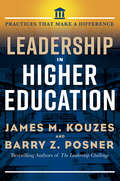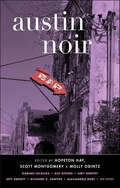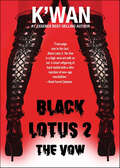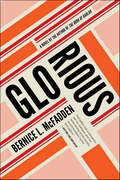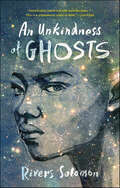- Table View
- List View
Office Shock: Creating Better Futures for Working and Living
by Bob Johansen Joseph Press Christine Bullen"A thoughtful, practical read about the future of the flexible office."—Adam Grant“Office shock” is an abrupt, unsettling change in where, when, how, and even why we work. In this visionary book, three prominent futurists argue that the office is both a place and a process—offices and officing—with a new range of choices, including what they call the emerging officeverse. To see the possibilities with fresh eyes, we must use future-back thinking to ask, What is the purpose of your officing? What are the outcomes—especially regarding climate—you want to achieve? With whom do you want to office? How will you augment your intelligence? Where and when will you office? How will you create an agile office? Traditional offices were often unfair, uncomfortable, uncreative, and unproductive. This book explores how to seize this great opportunity to transform office work.
Small Change: Why Business Won't Save the World
by Michael EdwardsA powerful critique of a seemingly beneficial trend that is actually undermining the effectiveness of philanthropy Written by an insider -- a former official with several high-profile nonprofits Co-published with the prominent New York think tank Demos A new movement is afoot that promises to save the world by bringing the magic of the market to philanthropy. Nonprofits should be run like businesses, its adherents say, and businesses can find new sources of revenue by marketing goods and services that benefit society. Dubbed “philanthrocapitalism,” its supporters believe that business principles can and should be the primary drivers of social transformation. What could be wrong with that? Plenty, argues, former Ford Foundation director Michael Edwards. In this hard-hitting, controversial expose he marshals a wealth of evidence to show just how far short the promise of philnthrocapitalism has fallen, and why the whole concept is fundamentally flawed. Some business practices can be beneficial to nonprofits, and it’s definitely a good thing that the for-profit sector is developing a social conscience. Edwards carefully specifies when businesses and business thinking can help. But to really get at the root causes of the systemic problems most nonprofits wrestle with—hunger, poverty, disease, violence—requires a completely different way of operating. Social transformation demands cooperation rather than competition, collective action more than individual effort, and values patient, long-term support for solutions over short-term results. Philanthrocapitalism concentrates power in the hands of a few major players, mirroring the very inequities civil organizations should be trying to ameliorate. With a vested interest in the status quo it shies away from fundamental change. At most all it can promise is valuable but limited advances: small change. Ultimately, Edwards argues that the use of business thinking can and does corrupt civil society. It’s time to differentiate the two and re-assert the independence of global citizen action.
Managing for People Who Hate Managing: Be a Success By Being Yourself
by Devora ZackProfessional success, more often than not, means becoming a manager. Yet nobody prepared you for having to deal with messy tidbits like emotions, conflicts, and personalities—all while achieving ever-greater goals and meeting ever-looming deadlines. Not exactly what you had in mind, is it? Don't panic. Devora Zack has the tools to help you succeed and even thrive as a manager. Drawing on the Myers-Briggs Type Indicator, Zack introduces two primary management styles—thinkers and feelers—and guides you in developing a management style that fits who you really are. She takes you through a host of potentially difficult situations, showing how this new way of understanding yourself and others makes managing less of a stumble in the dark and more of a walk in the park. Her enlightening examples, helpful exercises, and lifesaving tips make this book the new go-to guide for all those managers looking to love their jobs again.
Healing Our Future: Leadership for a Changing Health System
by Andy GarmanThis book is a practical, evidence-based guide to seven key leadership disciplines that will help anyone working in healthcare to pursue brighter futures.In this book, Andrew Garman looks at the major changes facing healthcare organizations and the leadership competencies required to successfully meet those challenges. He explains how people become more effective leaders over time and what science tells us works best in making this happen. At the heart of this book are seven universal disciplines—values, health system literacy, self-development, relations, execution, boundary-spanning, and transformation—which Garman divides into "enabling" and "action" disciplines. The enabling disciplines encompass the foundational work that makes leadership efforts more effective: learning more about ourselves, deepening our understanding of the world around us, and taking care of ourselves. The action disciplines describe leadership in the context of getting the work done: setting and resetting direction, collaborating inside and outside our organizations, anticipating what's coming, and helping people prepare for it. Collectively, they form an evidence-based common language of leadership that readers can easily map to any model that their organization or profession may already be using. Each chapter provides a description of the discipline, illustrates why it is important, and offers specific advice on how to raise proficiency. Appendixes offer step-by-step guidance on recruiting and engaging good mentors, along with input on developing long-term and foresight skills.
The 3 Simple Rules of Investing: Why Everything You've Heard about Investing Is Wrong — and What to Do Instead
by Carol Fabbri Michael Edesess George Peacock Kwok L. TsuiWhat if the most effective investment portfolio was also the easiest to manage and the least expensive? As the authors of this clear, practical, and enlightening book—part financial guide, part exposé—prove, there are just three simple rules you need to follow and only a few, very inexpensive investment products that are necessary for an ideal portfolio. The authors deftly bust investing’s myths—what they call investing's Seven Deadly Temptations—and dispense with all that complicated, confusing, and self-serving advice of the Wall Street wolves. By embracing commonsense solutions and rejecting investments that seem enticing but are overpriced, needlessly complex and risky, you'll put not only yourself in a stronger position, but the entire economy as well.
Creating Introvert-Friendly Workplaces: How to Unleash Everyone’s Talent and Performance
by Jennifer Kahnweiler"This important book offers organizations the keys to introvert inclusion."—Susan Cain, New York Times bestselling author of Quiet InfluenceThe first guide to creating a welcoming culture that maximizes the powerful contributions introverts bring to the workplace.As the diversity, equity, and inclusion wave widens and deepens its reach, introversion is becoming a natural part of that movement. After all, about half the population identify as introverts, but many organizations are stuck in traditional extrovert-centric workplace cultures that reward people for speaking up publicly, expect them to log face time, and employ hiring and promotion practices rooted in the past. This ultimately discourages introverts from contributing and reaching their full talent potential, which could have a major impact on the bottom line."Champion for introverts" Jennifer Kahnweiler offers a road map for everyone in the workplace--including leaders, human resource managers, and team members--to create inclusive, introvert-friendly cultures. Kahnweiler provides an assessment to determine how introvert friendly your organization is and looks at every aspect of organizational life--hiring, training, leading, communicating, meeting, designing workplaces, and more--through an inclusive lens. You'll discover how to make open-space offices introvert friendly, what the best practices are for encouraging introverts to participate on teams, which training techniques work best for introverts, and how to make remote positions work.
The Courage Gap: 5 Steps to Braver Action
by Margie Warrell, PhDThe Courage Gap offers on-point leadership advice. —Kirkus ReviewsDo you sometimes hold back when you know you need to speak up or step forward?Fear creates the gap. Courage closes it.This powerful guide from the bestselling author of You've Got This! cuts through the hype to connect the 'why' of courage to the 'how' of courage. Drawing on cutting-edge research woven together with stories that compel head and heart, The Courage Gap will help you bridge the think/do gap between what you've been doing and what you can do; between where you are and where you want to be-in your career, relationships, leadership, and life. Distilling theory and hard-won wisdom spanning from Margie's childhood in rural Australia to her decades of living around the world and coaching ‘insecure overachievers' in Fortune 500 organizations, Margie shares a powerful 5-step roadmap to reprogram the self-protective patterns of thought and behavior that sabotage success to bring your bravest self to your biggest challenges and boldest vision. At a time when courage seems in short supply, in a culture continually stoking insecurity and anxiety, this book will transform your deepest fears into a catalyst for your highest growth and the greatest good. Applying the five steps will:• Ignite passion and unlock the potential fear holds dormant• Rewrite the scripts that have kept you stuck, stressed, and living too safely• Reset your ‘nervous' system and embody courage in critical moments• Transform discomfort as a cue to step forward and expand your bandwidth for bold action• Reset your relationship to failure and make peace with the part of you that wimps out For leaders, The Courage Gap provides a guide to operationalize and scale the courage mindset across your team and organization to deepen trust, dismantle silos, foster innovation, accelerate learning, and unleash collective courage toward a more secure and rewarding future.
Mission, Inc.: The Practitioners Guide to Social Enterprise (false)
by Kevin Lynch Julius Walls, Jr.Business has the power to change the world, but some businesses embrace that opportunity more aggressively than others do. Social enterprises put their change mission first – what they sell or what service they provide is a means to accomplishing a larger goal, rather than an end in itself. Their front-and-center commitment to doing good makes social enterprises immensely attractive. But if you want to run one successfully, you have to manage a tricky balancing act. How can you be as efficient as any of your for-profit or nonprofit competitors while at the same time staying true to your social purpose? In this groundbreaking guide, social entrepreneurs Kevin Lynch and Julius Walls draw on their own extensive experiences and those of twenty other social enterprise leaders to focus on the fundamental blocking and tackling tactics that make the difference between success and failure. Exploring the many paradoxes that can hamstring social enterprises, the authors explain how starting and running a social enterprise requires leaders to adopt an entirely different mindset and often a wholly different perspective on the day-to-day choices they’re forced to make. Likewise, Walls and Lynch help readers grapple with a different set of expectations from employees, investors, customers, and the community. For social enterprise practitioners, these expectations present an added layer of difficulty – but they can also offer unique advantages, which the authors explain how to leverage. Whether readers are looking for guidance on finding and hiring talent, marketing, finances, or scaling, this practical, accessible guide offers clear and compelling answers that light the way.
Las Vegas Noir (Akashic Noir #0)
by Jarret Keene, Todd James PierceIn this chilling portrait of America's Sin City, lady luck is just as likely to dispense cold hard cash as a cold-hearted killing. Akashic Books continues its groundbreaking series of original noir anthologies, launched in 2004 with Brooklyn Noir. Each story is set in a distinct neighborhood or location within the city of the book. Brand-new stories by: John O’Brien, David Corbett, Scott Phillips, Nora Pierce, Tod Goldberg, Bliss Esposito, Felicia Campbell, Jaq Greenspon, José Skinner, Pablo Medina, Christine McKellar, Lori Kozlowski, Vu Tran, Celeste Starr, Preston L. Allen, and Janet Berliner.From the introduction by Jarret Keene & Todd James Pierce:“‘Ooh, Las Vegas,’ sang the pioneering country-rocker Gram Parsons. ‘Every time I hit your Crystal City, you know you’re gonna make a wreck out of me.’ As Las Vegans, we regularly read about these wrecked lives in newspapers and magazines. We routinely observe people going about their wildly destructive antics on mainstream TV. Often we can’t believe these stories are unfolding in our city. They almost seem like put-ons, elaborate pranks borrowed from atrocious cut-rate screenplays. But there they are, these inhabitants of our city, their mug shots staring us down, making us wonder if what Parsons said is really true—that in Las Vegas your only real friend is the queen of spades . . ."The stories gathered in Las Vegas Noir are written by longtime residents and avid chroniclers of Sin City, authors who take you far beyond the neon of Caesars Palace and into the neighborhoods too dangerous for CSI. Absolutely cliché-free, these stories are full of flesh-and-blood characters trapped in dire circumstances that only real Las Vegas neighborhoods can spring."
Home Girl: A Novel
by Alex WheatleWhen Naomi, a fourteen-year-old white girl, is placed with a black foster care family, her life takes some dramatic twists and turns.“Another powerful and poignant novel deftly created by one of the most prolific master novelists on either side of the pond. Home Girl is a page-turner, with not a dull moment. Loved it from the rooter to the tooter.” —Eric Jerome Dickey, New York Times best-selling author of Before We Were WickedNew from the best-selling black British author Alex Wheatle, Home Girl is the story of Naomi, a teenage girl growing up fast in the foster care system. It is a wholly modern story which sheds a much-needed light on what can be an unsettling life—and the consequences that follow when children are treated like pawns on a family chessboard.Home Girl is fast-paced and funny, tender, tragic, and full of courage—just like Naomi. This is Alex Wheatle’s most moving and personal novel to date.
Repacking Your Bags: Lighten Your Load for the Good Life
by Richard J. Leider David A. ShapiroIn this revised and updated new edition of a classic—over 560,000 copies sold and translated into 18 languages—is a practical guide for "unpacking" your physical, emotional, and intellectual baggage and "repacking" for the journey ahead. People everywhere feel overwhelmed today—weighed down by countless responsibilities and buffeted by never-ending changes in their personal and professional lives. Repacking Your Bags shows readers how to climb out from under these burdens and find the fulfillment that is missing in their lives. "Living in the place you belong, with the people you love, doing the right work, on purpose." This is how Richard Leider and David Shapiro define the good life. Technological advancements, economic shifts, and longer lifespans mean most of us will need to repeatedly reimagine our lives. In this wise and practical guide, Leider and Shapiro help you weigh all that you're carrying, leverage what helps you live well, and let go of those burdens that merely weigh you down. This third edition has been revised with new stories and practices to help you repack your four critical "bags" (place, relationship, work, and purpose); identify your gifts, passions, and values; and plan your journey, no matter where you are in life.
The Peon Book: How to Manage Us
by David HaynesManagement books are traditionally written by industry "experts": scholars, consultants, senior managers. They're writing about how to manage workers, but none of these experts really understands the viewpoint of the average worker, the regular grunt in the trenches-the peon. Peons are the ones affected when a manager decides to manage-in-one-minute, to move somebody's cheese, to try that fifth discipline. Rather than consult some expert, why not go to the source, and ask the peons? Who better to teach you how to train a dog than the dog himself? And who better to tell you how to manage than one of those who are being managed? The Peon Book gives managers the perspective they've been lacking. Author and self-proclaimed Chief Executive Peon Dave Haynes' sole, powerful source of expertise is that he has been managed in different companies and in different industries, and he knows what worked-and what failed catastrophically. In irreverent, straight-talking terms, Haynes tells managers what they really need to do to make their employees motivated, committed, and productive-and it's not memorizing yet another "technique" or "strategy" or "discipline." Haynes writes in a common sense, easy-to-read style that is both witty and wise. Every boss can benefit, and every employee can empathize with the words in The Peon Book. "The inability to empathize can be a real speed bump on the road to a trusting, personal relationship with your employees. So how are you supposed to show more empathy? I take issue with management books that give you a phrase to say to show empathy like 'I understand,' or 'I know what you mean,' or that say that by rephrasing a statement you can show empathy. Don't use some coined phrase to show empathy, just mentally put yourself in our shoes. Sometimes it's just a matter of remembering what it's like to have to get all those reports turned in on a Friday. Or remembering what it's like to have to ask for time off. Or remembering what it's like to be the new guy on the job, and have a hard time remembering everything. Do you see the key concept I'm getting at? Empathy = remembering. Who said you'd never use math in the real world?"
Robert K. Greenleaf: A Life of Servant Leadership
by Don M. FrickThousands if not millions of people have heard the term “servant leadership,” introduced by Robert K. Greenleaf in his landmark essay The Servant as Leader, published in 1970. There are now Centers for Servant Leadership in ten countries and counting. His work is regularly cited by some of the most prominent business writers and leaders in the world, such as Ken Blanchard, Stephen Covey, Peter Senge, Margaret Wheatley, and Peter Block. And yet until now there has been no biography of the man who first developed this revolutionary idea. Don Frick was given unfettered access to all of Greenleaf’s papers and correspondence. The result is a fascinating book that details the sources of Greenleaf’s thought, describes his friendships with dozens of well-known people, and shows how he influenced business history well before his first book was published at the age of 73, and lived his own life as a servant leader. As Director of Management Research at AT&T for 38 years, Greenleaf was known as “AT&T’s Kept Revolutionary.” Among other unusual initiatives, he oversaw a novel program which taught executive decision making through great literature, established the first corporate assessment center using knowledge gleaned from the OSS’s approach to training civilian spies during World War II, and invited leading philosophers and theologians to have conversations with AT&T executives. After a period of soul searching and some surprising experiments in consciousness, Greenleaf retired from AT&T and began to develop the concept of servant leadership, the then-heretical notion that leaders lead best by serving their followers rather than “commanding” them. He continued to promote the idea through teaching, writing, and consulting until his last years, and was instrumental in creating a score of important organizations such as The Center for Creative Leadership and Yokefellow Institute. Always, Greenleaf was a seeker opening himself up to novel experiences and astonishing people. He was a complex person—an introvert who served in public roles, a wise person who refused to give others “The Answer,” a brilliant thinker who often declared, “I am not a scholar.” His grave carries the epitaph he wrote for himself: “Potentially a good plumber; ruined by a sophisticated education.”
Locked Down, Locked Out: Why Prison Doesn't Work and How We Can Do Better
by Maya SchenwarThrough the stories of prisoners and their families, including her own family's experiences, Maya Schenwar shows how the institution that locks up 2.3 million Americans and decimates poor communities of color is shredding the ties that, if nurtured, could foster real collective safety. As she vividly depicts here, incarceration takes away the very things that might enable people to build better lives. But looking toward a future beyond imprisonment, Schenwar profiles community-based initiatives that successfully deal with problems—both individual harm and larger social wrongs—through connection rather than isolation, moving toward a safer, freer future for all of us.
The New Management: Bringing Democracy and Markets Inside Organizations
by William E. HalalA guide to the parallel revolutions in technology, organizations, and leadership, this practical yet thought-provoking book presents a wealth of evidence to show that the two recurrent themes of democracy and enterprise are transforming our institutions. Organizations are becoming changing clusters of entrepreneurial units working together to form "internal markets," while this diversity is being integrated into a "corporate community" that unites the interests of investors, workers, clients, business partners, and the public. Even fierce competitors are cooperating.o "Serving enterprises" make customers working partners in the creation of valueo "Knowledge entrepreneurs" form teams of self-managed internal enterpriseso "Internal markets" and "Corporate community" harness external forces to drive continuous changeo The power of "inner leadership" unites liberated workers, critical clients, and temporary business partnerso "Intelligent growth" offers strategic advantage that is ecologically benignIllustrative examples, survey data, trends, anecdotes, and exercises offer original insights into the use of New Management principles. In addition, mini-case studies of MCI, Saturn, The Body Shop, Hewlett-Packard, Johnson & Johnson, Southwest Airlines, Home Depot, IKEA, Wal-Mart and other great companies illustrate vividly how creative managers design and lead organizations in an era of global competition, constant change, and empowered people. The author also analyzes critical issues, such as the nagging old conflict between profit and society, to provide managers a comprehensive, stimulating guide to where their craft is heading.Halal argues that the transition to a New Management is almost inevitable because it is being driven not by altruism or even good leadership, but by the relentless advance of the Information Revolution. Only small entrepreneurial teams operating from the bottom-up can master today's exploding complexity, and gaining stakeholder support is now essential because a knowledge-based economy has made cooperation a competitive advantage. Rather than fussing over quick fixes, The New Management points the way toward more fundamental solutions to the massive changes that will confront all institutions as the transition to a knowledge society rolls on into the 21st century.
The Business of Building a Better World: The Leadership Revolution That Is Changing Everything
by David Cooperrider Audrey SelianTwenty-nine leading scholars and executives provide a visionary look at the future of business, propelling past damaging industrial-age values to uncover the key ingredients of humanistic, ecologically sustainable, and intergenerational prosperity.Through the exploration of robust cases and stories packed with deep insight and vital science, this extraordinary collection explores how we can adapt our notions of value, markets, and models of cooperation and collective action to create a world where economies and businesses excel, all people thrive, and nature flourishes.In part I, The Business of Business Is Betterment, the contributors show how enterprises today are further developing-and even taking a quantum leap beyond-the multistakeholder logic of shared value creation. Part II, Net Positive = Innovation's New Frontier, is focused on what companies can and are doing to move away from doing no harm to playing an active role in solving environmental, social, and economic problems. The final section, Ultimate Advantage: A Leadership Revolution That Is Changing Everything, looks at new leadership paradigms-characterized by unexpected qualities like virtue, love, compassion, and connection-that are crucial to creating engaged, empowered, innovative, and out-performing enterprises. This book is designed to galvanize change and unite a global community of inquiry and action. It establishes the conceptual cornerstones for a new kind of business practice that will lead the way to an equitable, sustainable, and flourishing future.
Entrepreneurs in Every Generation: How Successful Family Businesses Develop Their Next Leaders
by Pramodita Sharma Allan CohenDiscover What Makes Family Businesses Beat the Odds and Thrive over GenerationsFamilies are complicated; family businesses even more so. Like other companies, family-run enterprises must develop leadership and entrepreneurial skills. But they must also manage family dynamics that rarely mirror the best practices in the latest Harvard Business Review. Allan Cohen and Pramodita Sharma, scholars with deep professional and personal roots in family businesses, show how enterprising families can transmit the hunger for excellence across generations. Using examples of firms that flourished and those that failed, they describe the practices that characterize entrepreneurial individuals, families, and organizations and offer pragmatic advice that can be tailored to your unique situation.
Right Risk: 10 Powerful Principles for Taking Giant Leaps with Your Life
by Bill TreasurerWe must take risks if we are to grow personally and professionally. Risks are a part of a fully-lived life. But in the commotion of today's fast-paced, technology-driven world, people have become disconnected from the wise counsel of their inner resources, hampering their ability to make meaningful choices. Consequently, risks are increasingly being taken in an impulsive, haphazard, and often reckless way. In Right Risk, Bill Treasurer draws on the experiences and insights of successful risk-takers (including his own experiences as a daredevil high diver) to detail ten principles that readers can use to take risks with greater intelligence and confidence. Right Risk is about taking more deliberate and intentional risks in an increasingly complex world. It aims to answer such questions as: How do I know which risks to take and which to avoid? How do I balance the need to take more risks with the need to preserve my safety? How do I muster up the courage to take risks when it is so much easier not to? How do I confront all those people who keep telling me what a mistake it would be to take the risk? And, most importantly, How do I make risk-taking less of an anxiety-provoking experience? Right Risk will help readers take risks with greater discipline, focus, and maturity-to confidently face life's challenges and take advantage of life's opportunities.
Zero Space: Moving Beyond Organizational Limits
by Rene L. Tissen Frank Lekanne DeprezWhat would happen if you could achieve business success without owning any assets, but could simply enjoy the benefits of them? What if companies were able to react instantly to changing circumstances by operating in negative time? What if you didn't need management to run your business? Zero Space defines a business model in which an organization achieves success without owning assets or needing management. In a zero space organization, knowledge is the only true currency and people are the business's assets and its investors in future success. Through eight new organizational principles the authors illustrate how "zero-mindedness" is essential for the new economy. Just as organizations will have to exist in less tangible, less prescribed forms, so will thinking have to become less departmentalized, less closely guarded. This new open-mindedness or "zero mind-set" targets knowledge so that an organization applies it when and where it is really needed. The authors-two top executives at one of the "big five" accounting and consulting firms-show how to create a zero-space organization: a value-adding, quick-reacting, non-centralized, non-standardized, innovation-generating workplace for dedicated talent.
Leadership in Higher Education: Practices That Make A Difference
by Barry Posner Jim KouzesThe authors of the classic bestseller The Leadership Challenge bring their expertise to higher education, offering five practices that can make any college or university leader into an exemplary leader. Drawing on the same pioneering research that formed the foundation of their classic bestseller The Leadership Challenge (over 2.7 million copies sold), James Kouzes and Barry Posner offer a set of leadership skills and practices that will make a significant difference in every area of higher education—faculty, administration, library services, career counseling, auxiliary services, campus safety, and more. It's about the behaviors that leaders, regardless of their position, use to transform values into actions, visions into realities, obstacles into innovations, segments into solidarity, and risks into rewards. Kouzes and Posner tell the leadership story from the inside and move outward, describing it first as a personal journey and then as mobilizing others to want to do things they have never done before. The Five Practices of Exemplary Leadership is the operating system for this adventure. Leadership in Higher Education explains the fundamental principles that support these practices and provides case examples of people in higher education who demonstrate each one. A core theme that weaves its way through all the chapters is that, whether it's one to one or one to many, leadership is a relationship between those who aspire to lead and those who choose to follow. We need leaders who can unite us and ignite us. This book lights the way.
Austin Noir (Akashic Noir)
by Hopeton Hay, Scott Montgomery, and Molly OdintzAustin joins Dallas and Houston in Akashic's deep dive into the Lone Star State's darkest dimensions.“Seems like everybody comes to Austin, sooner or later, and now the Akashic Books series of original noir anthologies has finally arrived, its freshly inked pages strewn with shadows and ill intent.” —Austin ChronicleFrom the editors' introduction:"You've probably heard of Austin. You may have been here for South by Southwest. Your best friend may have recently relocated here from California. You might have thought about moving here yourself, then decided it wasn't worth it to live in Texas. You may have moved to Austin decades ago. You may even have been born and raised in Austin, and now you're on the outskirts of San Antonio or (God forbid) Waco because you can't afford to buy a house anywhere else. Or you may be living in a shiny new building downtown, watching the final stages of a sleepy town's transformation into modern metropolis. One thing you'll hear from almost any Austin resident: it was better when they got here . . . "As the city expands, construction never stops, struggling futilely to keep up with new demand. The running joke is that the city bird is the crane. Rents and property values keep climbing. We fear becoming Dallas . . . The writers contributing to this collection represent a kaleidoscopic view of the city—not just in where they set the stories, but in their different social, economic, and cultural perspectives."Featuring brand-new stories by: Gabino Iglesias, Ace Atkins, Amanda Moore, Jeff Abbott, Scott Montgomery, Richard Z. Santos, Alexandra Burt, Lee Thomas, Miriam Kuznets, Jacob Grovey, Chaitali Sen, Molly Odintz, Amy Gentry, and Andrew Hilbert.
Black Lotus 2: The Vow
by K'wanAfter the death of a police officer, assassin Kahllah (aka the Black Lotus) is forced out of retirement in an attempt to clear her name while outrunning a mysterious enemy.“[A] riveting read from start to finish . . . Excellent.” —Exclusive MagazineIt’s been months since Kahllah El-Amin, aka the Black Lotus, hung up her pistols, retired from the murder-for-hire business, and finally found peace. But when a police officer is murdered and a familiar flower is left at the crime scene, all signs point to it being the work of the Black Lotus. Someone is trying to frame her. Things get more complicated when the case is handed to Detective James Wolf, a former adversary who has since become a friend.To clear her name, Kahllah is forced out of retirement and once again must don the mask of the Black Lotus. She races against time to catch the real killer while trying to outrun her most formidable rival. Their deadly game leads to a shocking truth buried under a mountain of lies, as Kahllah attempts to find justice in a world devoid of light.
Glorious: A Novel
by Bernice L. McFaddenAward-winning novelist Bernice McFadden's highly anticipated new historical novel set amidst the Harlem Renaissance.—Glorious was a finalist for the 2011 NAACP Image Award for Fiction.“McFadden’s lively and loving rendering of New York hews closely to the jazz-inflected city of myth. . . . McFadden has a wonderful ear for dialogue, and her entertaining prose equally accommodates humor and pathos.” —New York Times Book Review “Bernice L. McFadden’s novel Glorious, which starts with a bang-up prologue, has a strong main character (based in part on Zora Neale Hurston), hard-driving prose, and historic sweep of several decades, including the years of the Harlem Renaissance, which has always fascinated me.” —Jane Ciabattari, National Book Critics Circle PresidentGlorious is set against the backdrops of the Jim Crow South, the Harlem Renaissance, and the Civil Rights era. Blending fact and fiction, Glorious is the story of Easter Venetta Bartlett, a fictional Harlem Renaissance writer whose tumultuous path to success, ruin, and ultimately revival offers a candid and true portrait of the American experience in all its beauty and cruelty. It is a novel informed by the question that is the title of Langston Hughes’s famous poem Harlem: "What happens to a dream deferred?" Based on years of research, this heart-wrenching fictional account is given added resonance by factual events coupled with real and imagined larger-than-life characters. Glorious is an audacious exploration into the nature of self-hatred, love, possession, ego, betrayal, and, finally, redemption.
An Unkindness of Ghosts
by Rivers SolomonA breathtaking science fiction debut from a worthy successor to Octavia Butler.—One of Esquire magazine’s 50 Best Sci-Fi Books of All Time“Solomon debuts with a raw distillation of slavery, feudalism, prison, and religion that kicks like rotgut moonshine . . . Stunning.” —Publishers Weekly, Starred ReviewAster has little to offer folks in the way of rebuttal when they call her ogre and freak. She’s used to the names; she only wishes there was more truth to them. If she were truly a monster, she’d be powerful enough to tear down the walls around her until nothing remains of her world.Aster lives in the lowdeck slums of the HSS Matilda, a space vessel organized much like the antebellum South. For generations, Matilda has ferried the last of humanity to a mythical Promised Land. On its way, the ship’s leaders have imposed harsh moral restrictions and deep indignities on dark-skinned sharecroppers like Aster. Embroiled in a grudge with a brutal overseer, Aster learns there may be a way to improve her lot—if she’s willing to sow the seeds of civil war.
Ziggy Marley and Family Cookbook: Delicious Meals Made with Whole, Organic Ingredients from the Marley Kitchen
by Ziggy MarleyA cookbook inspired by the food of Ziggy's upbringing in the household of Bob and Rita Marley.“[Ziggy’s] first collection of recipes pays homage to the flavors of his youth and the food he loves to cook for his wife and five children.” —People“The easy directions will have you heading to the kitchen to try these recipes yourself.” —San Francisco ChronicleEight-time Grammy winner, author, philanthropist, and reggae icon Ziggy Marley’s first cookbook, Ziggy Marley and Family Cookbook: Delicious Meals Made with Whole, Organic Ingredients from the Marley Kitchen, is inspired by the Jamaican meals Ziggy enjoyed while growing up—with an updated healthy spin. Ziggy was raised with both traditional Jamaican food and the more natural “ital” food of his family’s Rastafari culture. The cookbook, including fifty-four recipes, features contributions from family members including Ziggy’s wife Orly, sister Karen, and daughter Judah, as well as several renowned chefs.Many of the recipes are vegetarian, vegan and/or gluten-free, from delicious and savory egg dishes, to healthy, nourishing juices, soups, and salads, to classic Jerk Chicken and fish recipes. The Ziggy Marley and Family Cookbook brings new organic and nutritious recipes to kitchens around the world, intended to promote healthy living with a touch of culture, comfort, and love.
